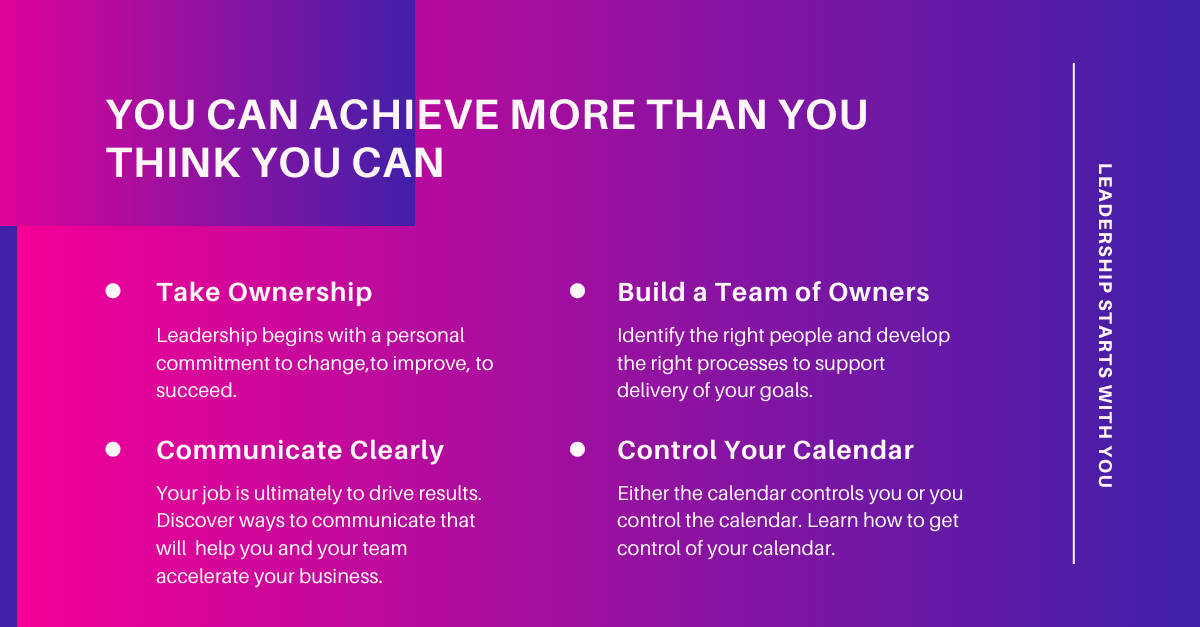Time is the most precious resource available to a leader. How you spend your time directly impacts your effectiveness.
Forty years ago, management guru Peter Drucker wrote The Effective Executive, which includes a chapter titled “Know Thy Time.” In it, he argues that time is the most precious resource available to a leader. Time is truly finite and without substitute. The other resources—capital, people, emotional energy—can be replenished or replaced. How you spend your time directly impacts your effectiveness. Either the calendar controls you or you control the calendar. If your calendar is out of control, it’s because you let it get out of control. You chose to allow others to dictate your priorities.
We often have our clients develop a calendar that maximizes their effectiveness and supports their drive for results.
A client, a chief executive, was already complaining in late October that his schedule for the next year was “out of control.” After taping 12 poster-sized calendars (one for each month of the upcoming year) to the wall, we began asking about the key “events” in his business:
- When are your board meetings?
- How far in advance do the directors need their materials?
- When do financial results get reported?
- How soon after the financial report should your team sit down together to review the results and adjust priorities?
- What kind of operational meetings should happen weekly, monthly, and quarterly?
- When should strategy be developed and how often should it be reviewed?
After recording the answers to these questions—but before plotting strategy retreats, budget reviews, and sales conferences—we asked the client when during the year he planned to spend time away from the business.
“When will you take two consecutive weeks off for vacation?” we asked.
As is often the case when we raise this issue this early in the process, the client was bewildered, and he gave us the “Are you nuts?” look. We countered his shock with a simple argument: The brand of leadership we advocate requires balance and energy. Finding ways to unplug from your responsibilities can stimulate fresh perspectives and renewed energy. If you accept the responsibility that comes along with leadership, you need to take responsibility for keeping yourself healthy. Taking time away and developing an operating calendar that supports your efforts at leading can have a big impact on your success. Plus, you’ll be modeling a behavior that will pay dividends in your organization by showing that you value people’s lives away from the office.
Track Your Time
If you agree with Drucker that time is a precious resource, then in addition to planning it well, you must be disciplined about how you spend it—day by day, hour by hour. Can anyone walk into your office at any time? Is your assistant clear on what percentage of your time should be spent on any one activity in a single month? Do the meetings you run start and end on time?
To determine whether they’re actually spending their time where they feel they should, we ask clients to try a simple exercise. On a blank sheet of paper, we have them write down the top five activities that they should be spending their time on in a single quarter— “Developing my people,” “Meeting with customers,” etc. Next to each activity, we ask them to assign the percentage of time they believe each of these activities should consume in that quarter. We recommend that the five activities add up to approximately 90 percent (with the remainder set aside for blue-sky thinking or containing unexpected fires).
Next, we have them review their calendar from one of the last few quarters to determine how they actually spent their time. Most leaders are amazed by how far off their real calendar is from their ideal calendar. Finally, we recommend that they determine which “unlisted” activities ate up most of their time—and develop action plans for eradicating or delegating those things.
Like most difficult endeavors, managing your time requires explicit goal setting, regular analysis, and disciplined follow-through. But it is an essential skill if you want to maintain long-term success at driving results in your business. And as is the case with making decisions, when you ask your team for help, your time management is likely to be better—and your chances for achieving that ideal calendar will improve.
Cast Your Shadow
As a leader, how you spend your time not only dictates your own effectiveness; it also has an enormous impact on your direct reports and the entire organization. To paraphrase Ralph Waldo Emerson, we are always struck by the shadow the leader throws on nearly everyone in his or her organization. Leaders need to recognize how their behaviors, including time management, influence others. If you spend time with your important customers and constantly talk about it, your subordinates will follow suit. If you show up late to meetings, time discipline will suffer throughout the organization.









